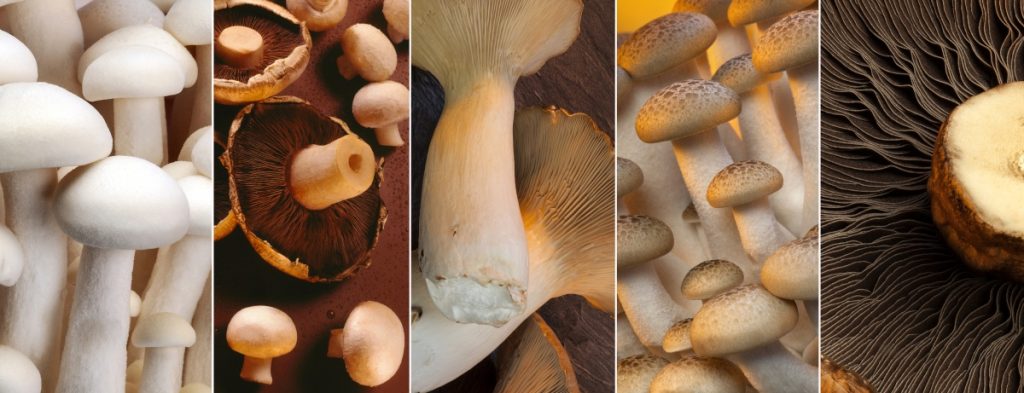As more people discover the taste and health benefits of mushrooms and include edible mushrooms in their daily menus, a broader selection of mushrooms is now available.
Many mushroom recipes use the caps of mushrooms and suggest discarding the stems. But, doing this feels rather wasteful.
Which brings us to the question: Can you eat mushroom stems? And, if so, how do you cook with them?
Keep reading to find out.
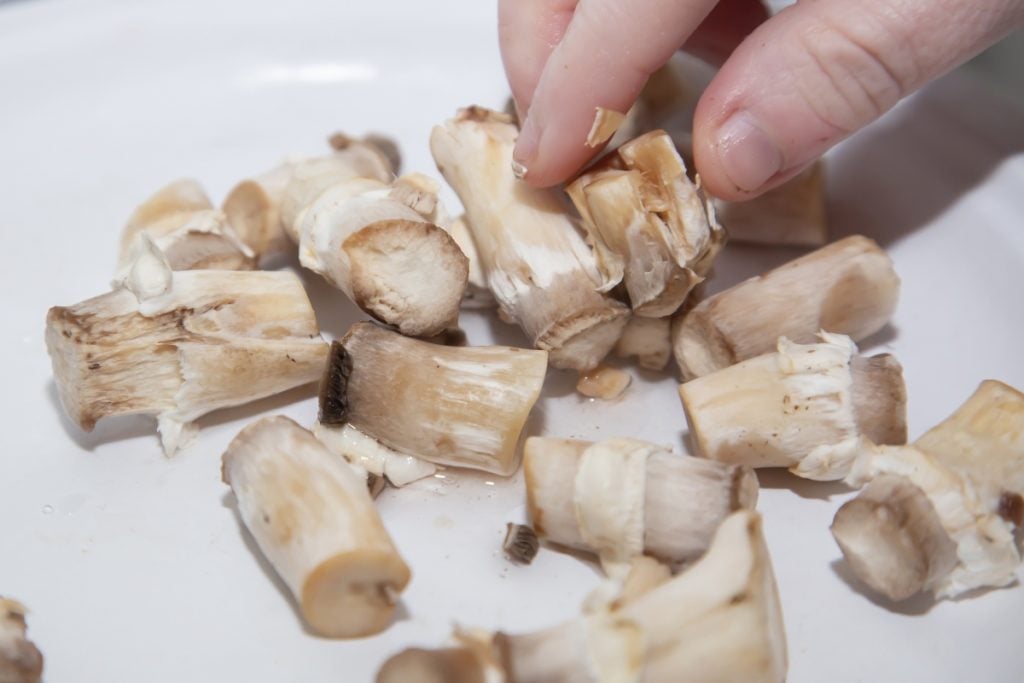
Can You Eat Mushroom Stems?
Yes, you can eat the stems of edible mushrooms, but you may not always want to.
Some mushrooms have flavorless stems that are very woody, making them tough and unappealing to eat.
In these cases, it’s better to remove the stems before cooking the mushrooms and use them in other ways.
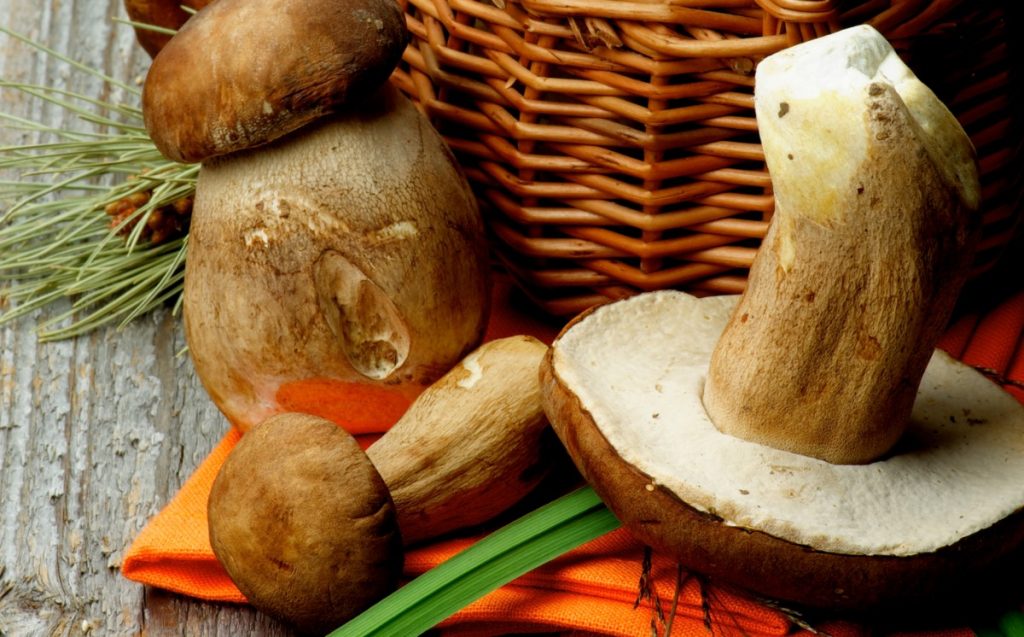
Are Mushroom Stems Good to Eat?
Some mushroom stems are very good to eat, and in certain species, like king oysters and enoki mushrooms, the stem is the most desired part of the mushroom.
Chanterelle, black trumpet, porcini, cremini, chestnut, portabella and white button mushrooms also have delicious stems that are good to eat.
Mushroom stems have the same delicious flavor as the caps, but are often not as tender as they’re high in fiber.
This characteristic makes them useful for flavoring soups and broths as you can cook them for longer than mushroom caps.
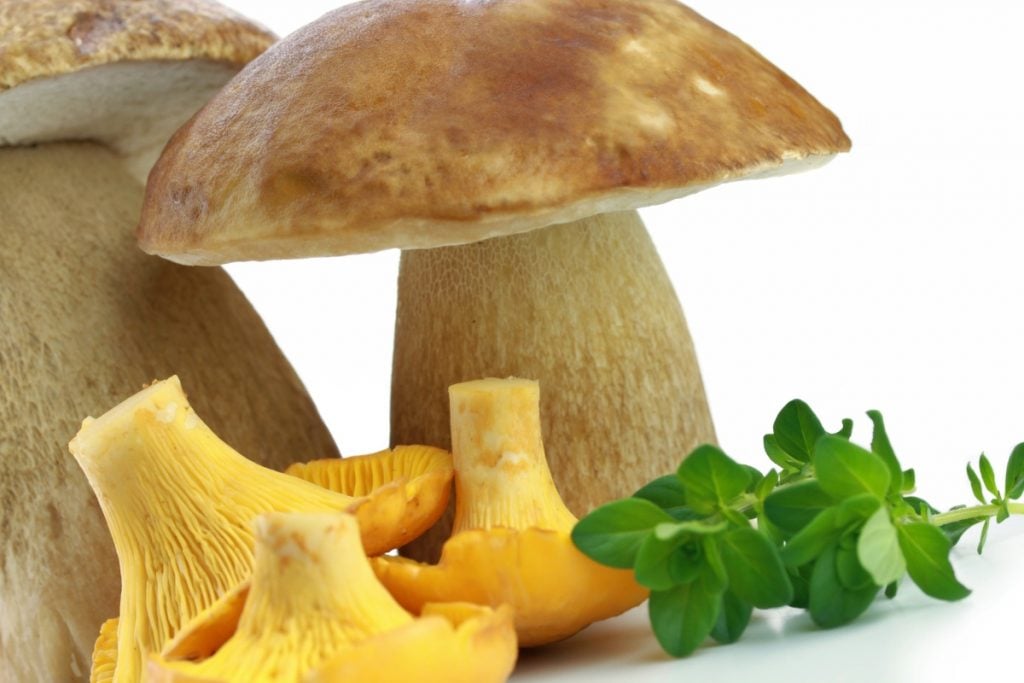
Do You Have to Remove Mushroom Stems?
You don’t always have to remove mushroom stems, and whether you should or not will depend on the type of mushroom you are preparing and how you plan to cook it.
Some mushrooms, like shiitake, have very woody stems that you should remove before you slice and cook the caps. But, you don’t need to discard the stems as you can use them to flavor other dishes.
You can eat the caps and stems of several other edible mushrooms, such as cremini, chanterelle, porcini, morel, hedgehog, and oyster mushrooms together.
Slice the entire mushroom lengthways, cook them whole or chop both the stems and caps into chunks and use them in your favorite recipes.
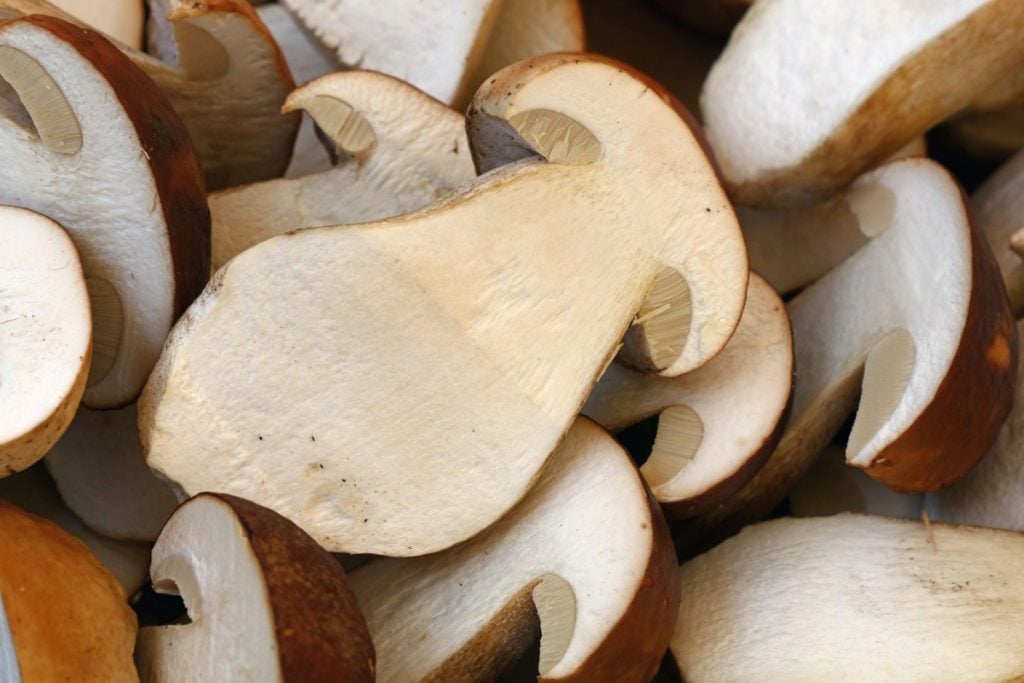
Are Mushroom Stems Poisonous?
Mushroom stems can be poisonous if they are part of a poisonous mushroom. When foraging for wild mushrooms, only collect those that you are 100% sure are edible.
There are a few characteristics that can help you determine which mushrooms to avoid as there’s a possibility of them being poisonous.
Many edible species also have some of these characteristics, and you may miss out on a delicious meal. But you’ll avoid the risk of getting seriously ill or even dying.
Mushrooms with white gills, a ring around the stem and a volva at the base of the stem are often poisonous, and mushrooms with red on the cap or stem are also hallucinogenic or poisonous.
Our article on the parts of a mushroom will help you identify these characteristics and avoid poisonous mushrooms.
The stems of edible mushrooms are not poisonous, but it’s still advisable to cook most mushroom stems before eating them.
The cell walls of raw mushrooms contain chitin, a fibrous substance made of polysaccharides that is hard for humans to digest.
But, cooking breaks down the chitin walls, making it easier to digest and absorb all the healthy nutrients in mushrooms.
What’s more, some mushrooms, including the common white or button mushroom, contain small amounts of a carcinogenic toxin called agaratine.
The good news is that cooking destroys agaratine.
Can You Eat Crimini Mushroom Stems?
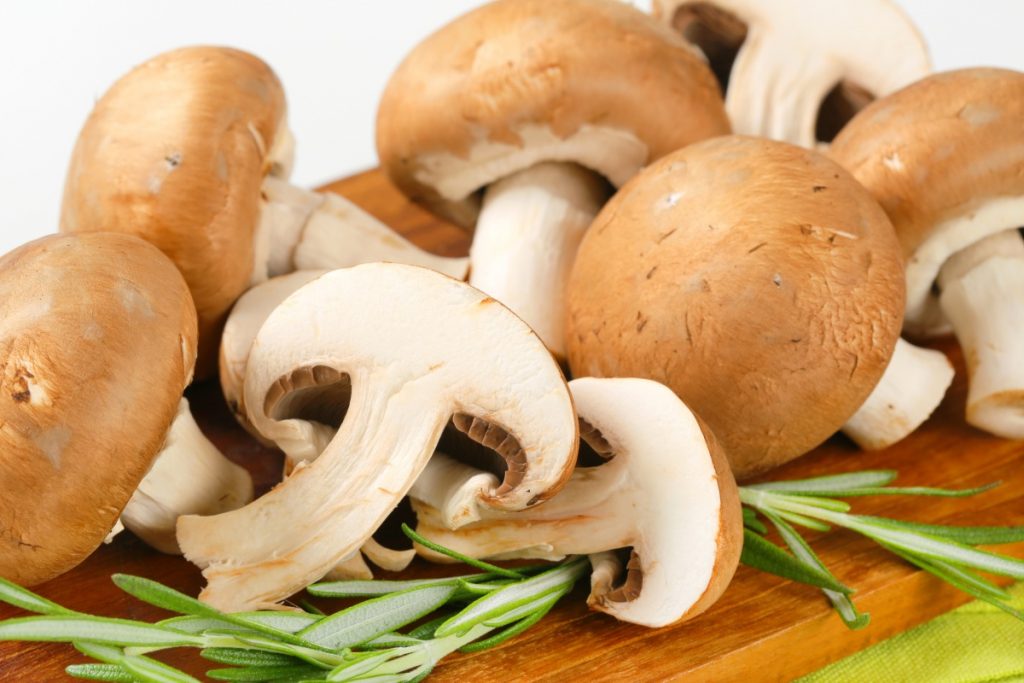
Yes, you can eat crimini mushroom stems. Every part of a cremini mushroom is edible, and you can cook and enjoy the stems and caps together.
The stems are sometimes a little tougher than the caps. If you find the stems a little chewy, try cooking them slightly longer to break down the chitin.
Can You Eat Portabella Mushroom Stems?
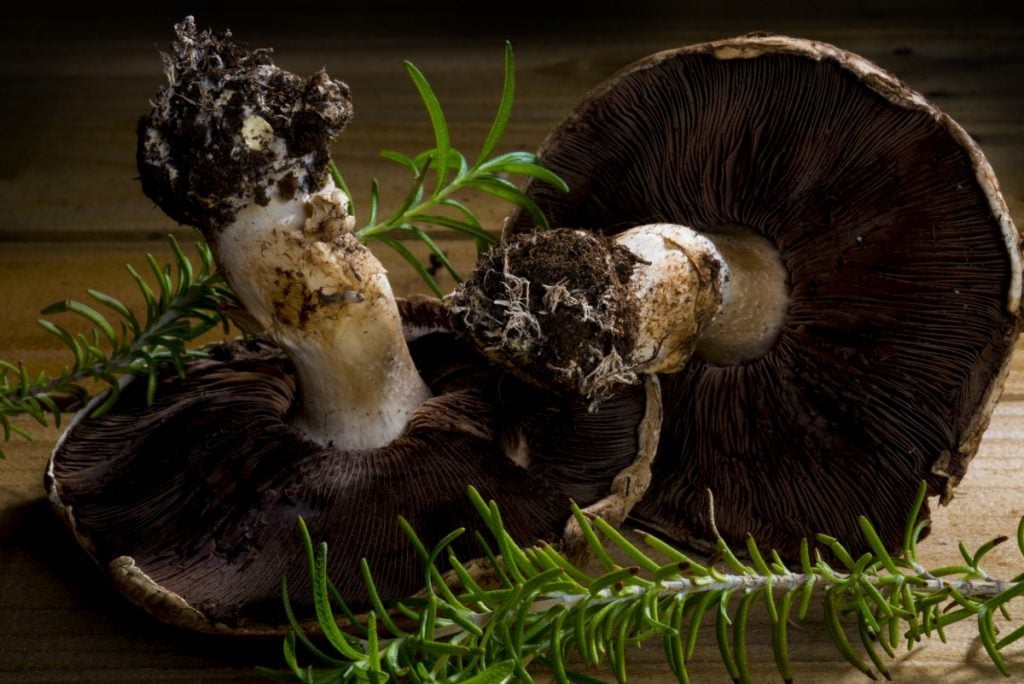
Portabellas are mature crimini mushrooms, so their stems are edible. But they can be fibrous and woody and thus are often removed and discarded.
Portabellas, known for their large flat brown caps, have a delicious meaty flavor and are a favorite mushroom for stuffing.
Removing the stems provides more space for the stuffing, but you should save the stems as you can eat and enjoy them in several other delicious ways.
Can You Eat Shiitake Mushroom Stems?
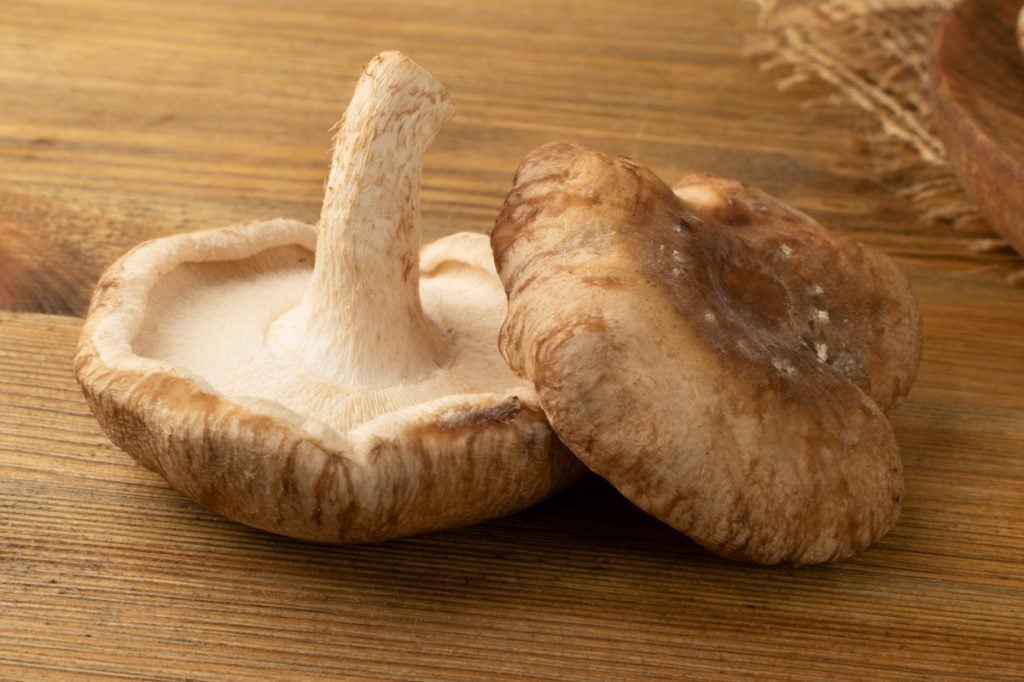
Shiitake mushroom stems, although technically edible, are not good to eat as they’re often too tough and fibrous.
It’s best to remove shiitake stems before cooking the caps, but don’t discard them.
They’re full of flavor and a few stems added to broths, soups and risotto produce rich mushroom flavors and delicious earthy aromas.
Shiitake stems aren’t easy to twist off, so you may need a sharp knife to remove the stems where they attach to the cap.
The Most Enjoyable Mushroom Stems to Eat
Not all mushroom stems are tough and woody. Some varieties of mushrooms are grown specifically for their stems.
Here are some of the most enjoyable and sought after edible mushrooms stems:
King Oyster
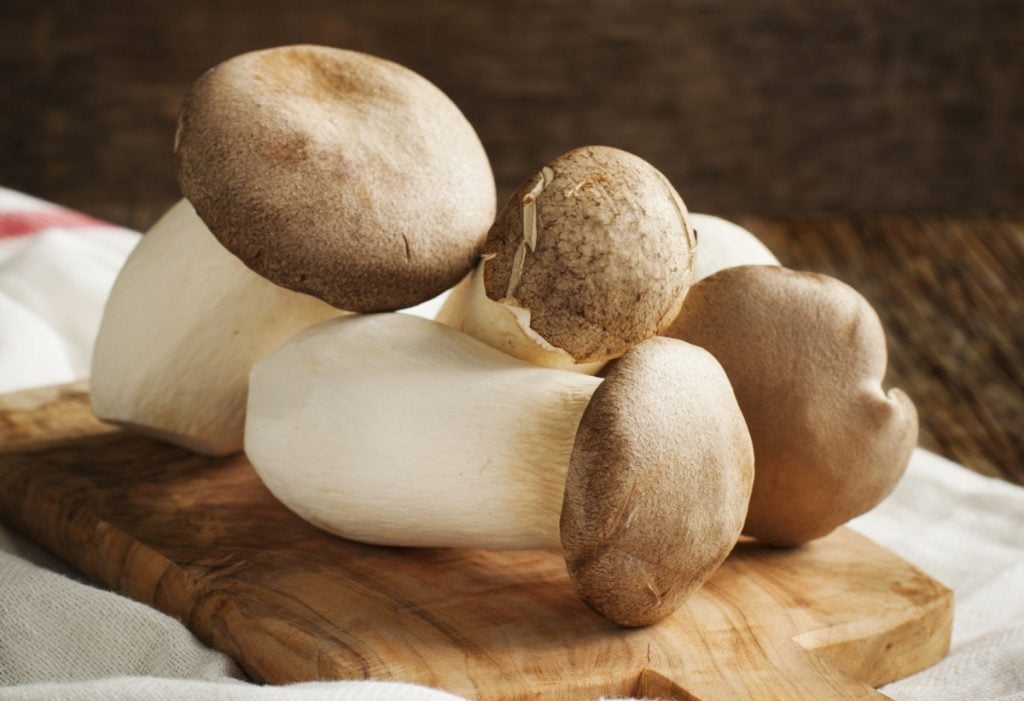
When you think of delicious mushroom stems, the king oyster mushroom stem is one of the first to come to mind.
The king oyster, or king trumpet mushroom, is almost entirely made up of a thick stem topped with a smallish cap.
The king oyster stem is delicious and highly sought after for its dense texture and rich flavor. It’s often served as an alternative to meat as it retains its firmness even when cooked.
For a tasty treat, cut king oyster mushroom stems into medallions and saute them until golden brown. They also work well in stir-fries, and you can roast, grill and barbecue them.
Morel
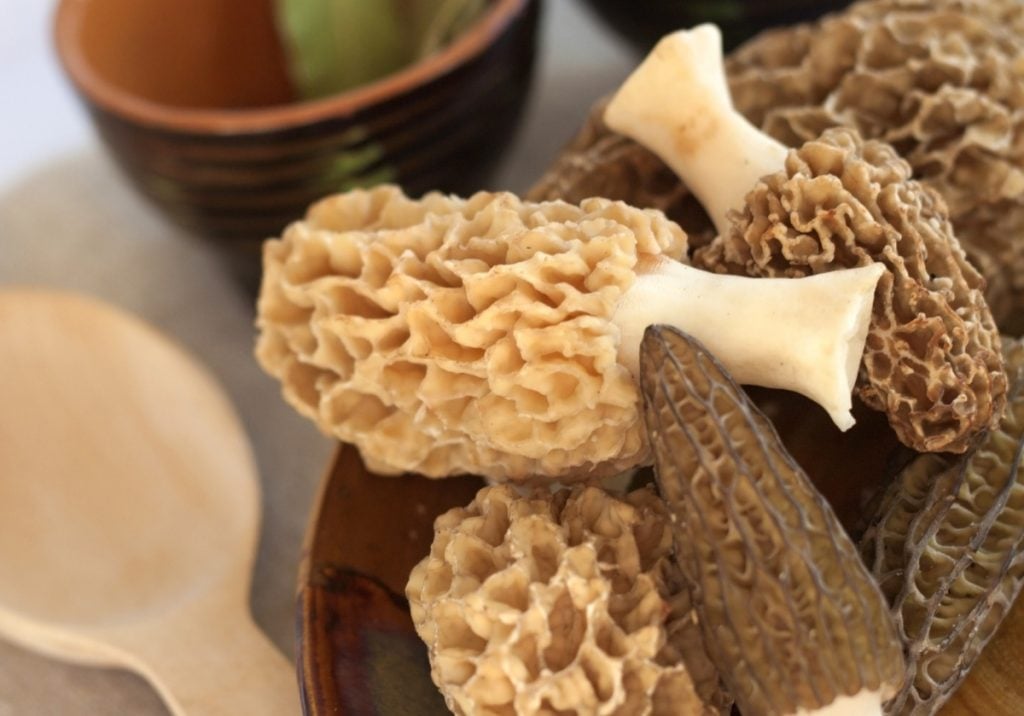
Morel mushrooms have a unique flavor and are one of the most expensive and sought-after mushrooms in the world.
They’re difficult to cultivate and only found fresh for a few months of the year in the wild, making them a treat for those who can get them.
You can enjoy both morel caps and stems. Their deep nutty, earthy flavor is best appreciated if you cook them alone. But, always cook morel stems and caps as raw morel can cause digestive upsets.
These unique mushrooms have a meaty but tender texture and taste wonderful when sauteed in butter.
There are endless possibilities. Some people like to cook morels in cream or wine, and you can even eat them stuffed or breaded.
Enoki
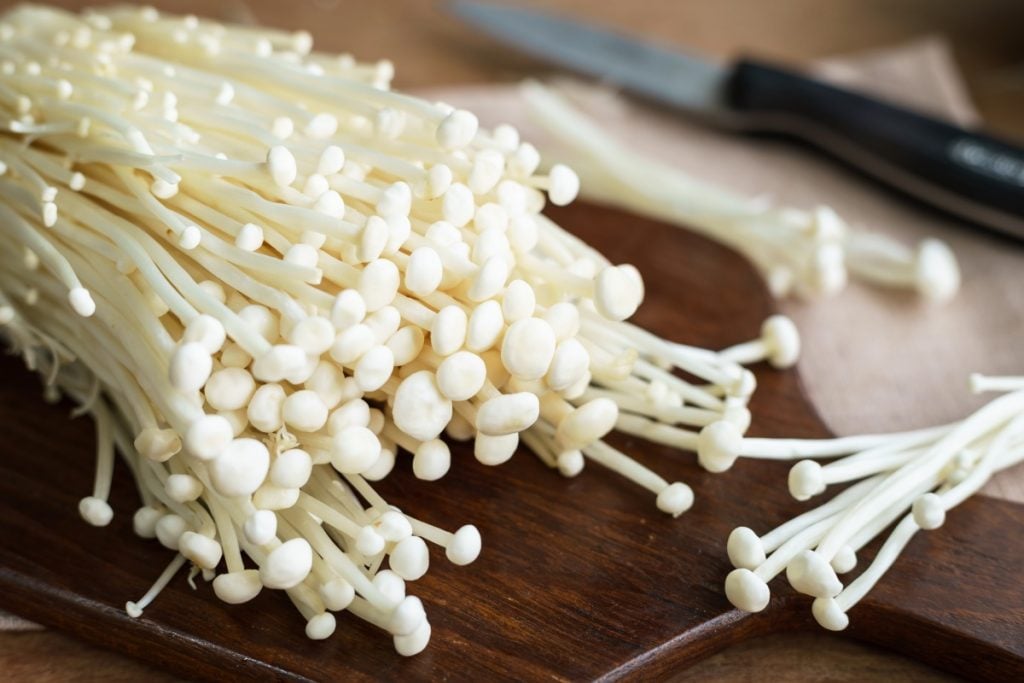
Enoki mushrooms, like king oysters, are another mushroom variety grown for their stems. But enoki stems are much thinner than king oyster stems.
Enoki mushrooms grow in clusters of long slender stems topped with small white caps and are extremely popular in east Asian cuisine.
You can eat enoki raw or cooked. Enokis have a mild fruity flavor and a firm texture. Try raw enoki mushroom as a crisp, crunchy addition to salads or cooked in soups, broths, stir-fries and risotto.
The secret is to cook them very lightly. Overcooked enoki can become tough.
Chanterelles
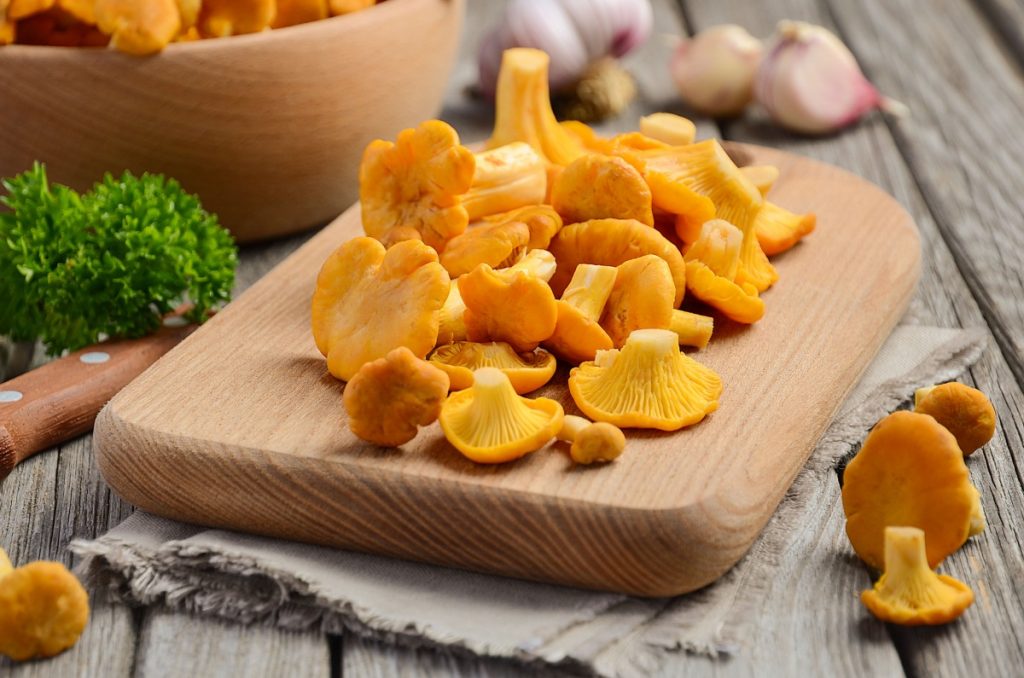
Chanterelles have a cup or trumpet-shaped cap and tasty edible stems that can be both thick or spindly.
Chanterelles are fabulous when cooked and served whole. Just trim off the very bottom of the stem before cooking them whole.
They’re not as easy to cultivate as other mushrooms, and chefs love to use them for their color and fruity yet peppery flavor.
Thus, like morels, they make our list of the most expensive mushrooms in the world.
Cooking accentuates the chanterelles flavors, but be careful not to overcook them.
When combining chanterelles with other ingredients that take longer to cook, cook the chanterelles quickly on high heat, then remove them from the pan.
Alternatively, cook them separately and add them to the dish at the last minute.
Chanterelles are very versatile and go well with butter, cream, oil, or wine. Chefs often use chanterelles in soups, cream sauces, and sautees.
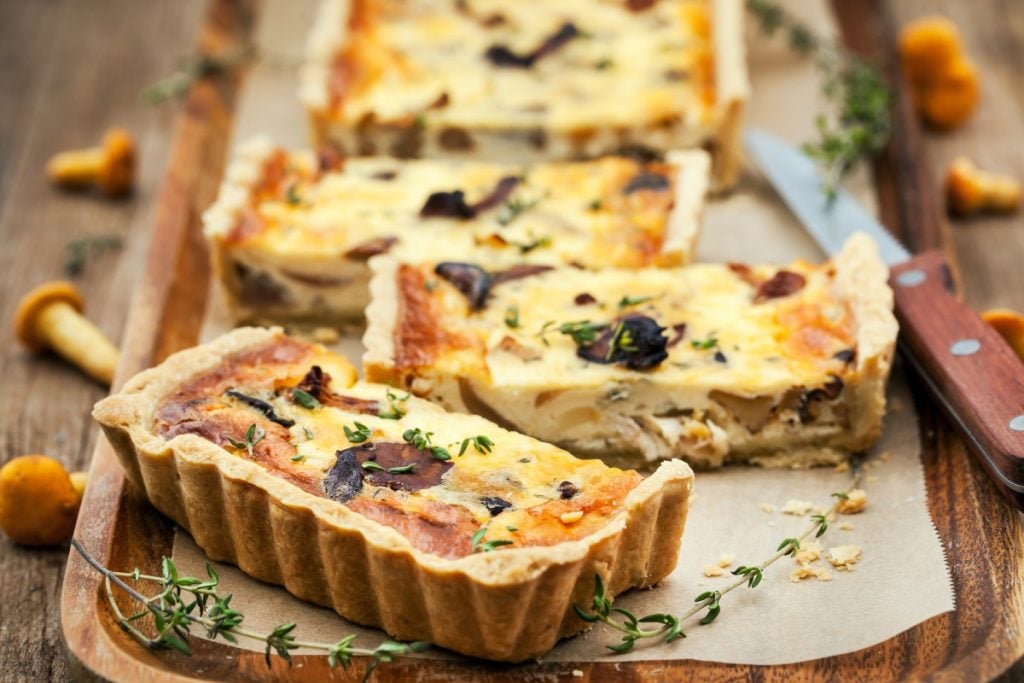
The Nutritional Benefits of Mushroom Stems
Mushrooms are not only tasty, but they’re also nutrient-rich, low in sodium and full of healthy dietary fiber, providing numerous health benefits.
Here’s the nutrient profile of a cup of raw white button mushrooms:
- 20 calories
- 0 grams of fat
- 3 grams of protein
- 1 gram of fiber
- 23% daily value of vitamin B2 (Riboflavin)
- 17% daily value of vitamin B3 (Niacin)
- 14% daily value of vitamin B5 (Pantothenic Acid)
- 13% daily value of selenium
- 13% daily value of copper
- 9% daily value of potassium
- 8% daily value of phosphorus
Most edible mushrooms have a similar nutrient profile, regardless of their shape, size, or color.
Mushroom stems have the same nutritional value as the rest of the mushroom but often contain more fiber than mushroom caps.
Like the rest of the mushroom, stems contain protein, minerals, vitamins and antioxidants that help to reduce or eliminate several health risks.
Want to learn more about the wide range of nutritional and health benefits of mushrooms?
Our article on the health and nutritional benefits of mushrooms has more information for you.
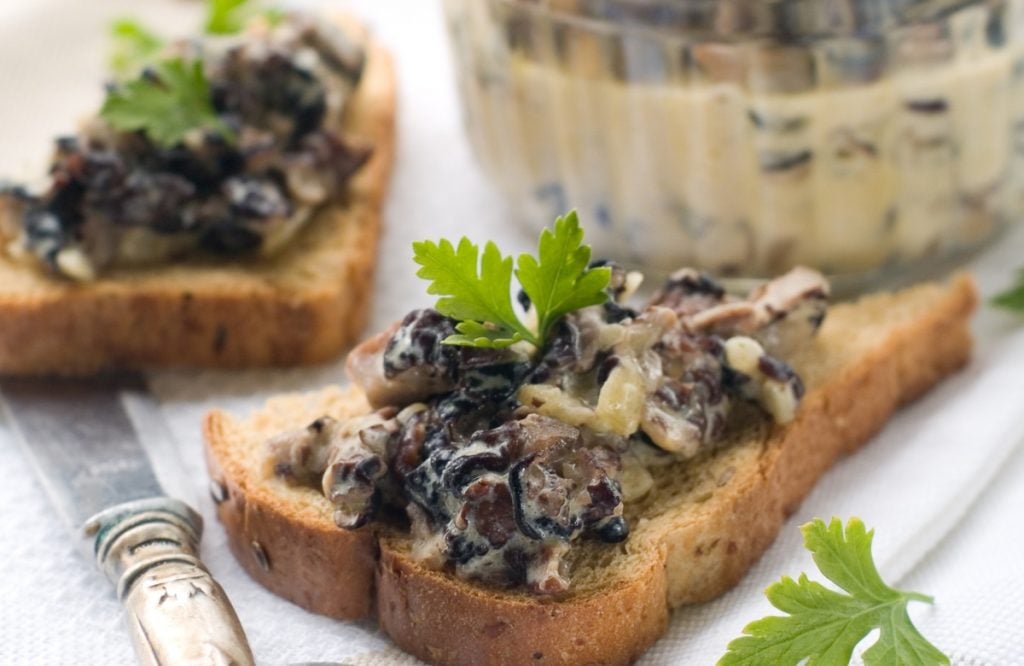
9 Ways To Use Mushroom Stems
So, yes, you can eat mushroom stems, and they’re good for you. But, now you may be asking yourself, “What can I do with mushroom stems?”
Here are nine different ways you can use mushroom stems:
1. In Soups
You can use mushroom stems instead of caps when making creamy mushroom soups. The stems have the same rich flavors as the caps, and because you’re blending the soup, looks don’t matter.
It is best to use tougher mushroom stems for creamy soups, but you can add chopped tender stems to chunky vegetable soups.
Tasty mushroom soups are also a great way to introduce babies to mushrooms.
2. To Make Broths and Stocks
It’s always useful to have a selection of homemade broths and stocks in your freezer.
Save mushroom stems and use them with other vegetables, meat, or bones to make broth or mushroom stock. Mushroom stems give the liquid a rich color and add earthy flavors.
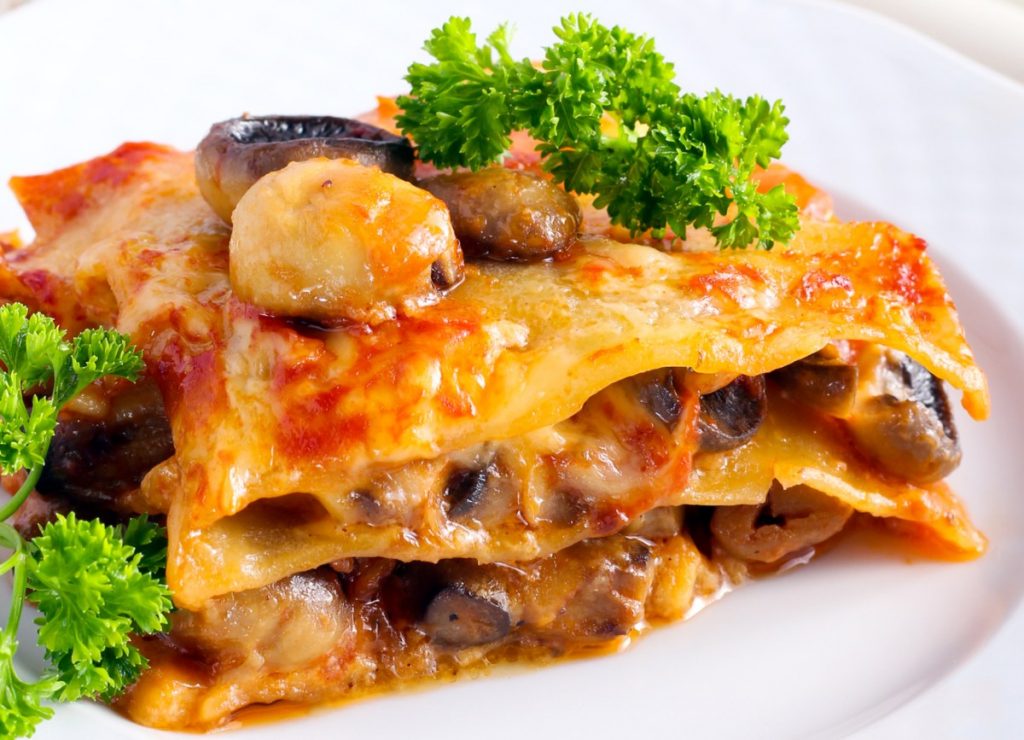
3. In Pasta Dishes
Use chopped mushroom stems to make pasta dishes that need a mushroom filling.
Mushroom lasagna requires a cooked chopped mushroom mixture, perfect for using mushroom stems.
You can also use chopped mushroom stems in fillings for pasta dishes like ravioli and manicotti.
4. As a Filling
People often use chopped mushroom stems as fillings for savory tarts, quiches, omelets and pies.
Mushrooms pair well with eggs, dairy and cheese, making them a popular addition to savory tarts and mushroom quiches.
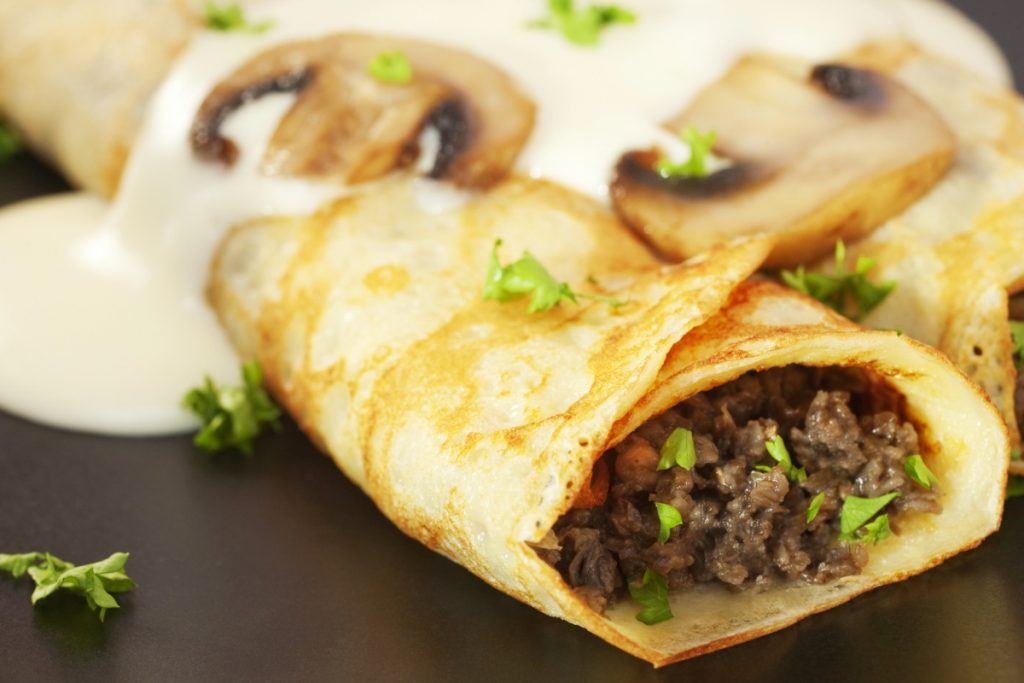
5. For Stuffing
Use chopped or minced mushroom stems alone or combined with other vegetables to create a delicious stuffing for meat or vegetables.
Try chopped mushroom stems with onion, garlic and spinach or cooked rice to make a stuffing for peppers, tomatoes, zucchini or vegan cabbage rolls.
6. To Make Duxelles
Mushroom duxelles is a paste-like mushroom condiment of French origin. Because you chop the mushrooms in duxelles so finely, mushroom stems are perfect for this recipe.
It consists of a combination of finely chopped mushrooms, shallots, and fresh herbs cooked together slowly to create intense flavors.
Traditionally people used duxelles to prepare beef wellington, but today it has several other applications.
Duxelles can flavor soups and sauces, fill omelets and ravioli, work as a decadent spread on toast or boost the flavor of mashed potatoes.
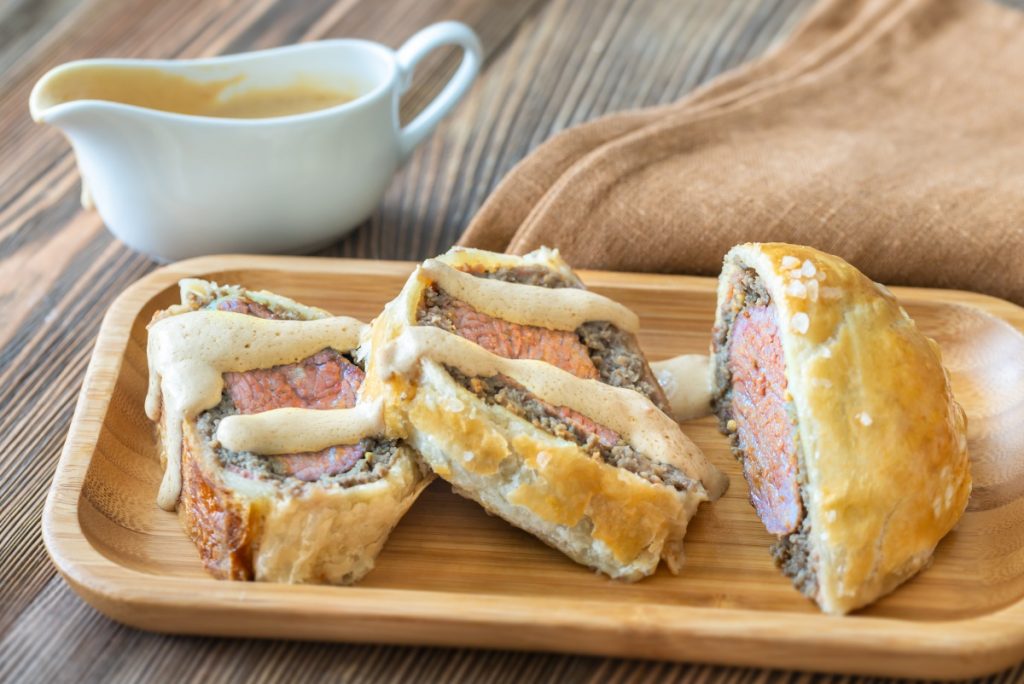
7. To Make Ragu
People usually make this classic Italian sauce with beef, veal or pork. But, vegetarians can use mushroom stems as a substitute for the meat and make mushroom ragu.
Serve delicious mushroom ragu with polenta or pasta, or use it as a tasty spread.
8. To Create Blended Burgers
Mix chopped mushroom stems with ground beef to create a blended burger. It’s a great way to cut back on meat and increase the moisture and flavor in your burger patties.
The savory flavor and meaty texture of mushroom stems go well with ground beef. You can use them in any recipe that uses ground beef, such as meatballs, meatloaf and tacos.
9. To Make Mushroom Powder
What if you have leftover mushroom stems and don’t plan to cook another mushroom dish in the next few days?
Dehydrating them and making mushroom powder may be a good option.
Dry the stems in a dehydrator or oven and then process them in a blender to create a fine powder.
You can store mushroom powder for up to a year in an airtight container away from light and heat.
Use your flavor-packed mushroom stem powder to add a boost of earthy flavor to any dish.
How to Cook With Mushroom Stems
Mushroom stems are very versatile. You can cook them in several different ways, including sauteing, simmering, grilling and roasting.
And, like the rest of the mushroom, they go well with just about anything.
Our article, “How To Cook Mushrooms: The Right Way!” has some tips on how to make the most of these nutritious fungi.
The recipe below is a great example of how you can use mushroom stems.
Crostini with Mushroom-Stem Duxelles
The easy and delicious recipe from Tasting Table uses leftover crimini stems and is perfect as a snack or appetizer.
Ingredients
- 1 baguette, sliced on the diagonal into ½-inch slices
- 1 tablespoon extra-virgin olive oil
- 1 tablespoon unsalted butter
- 1 medium shallot, finely chopped
- 1 garlic clove, finely chopped
- 1½ cups finely diced cremini mushroom stems from around 8 ounces (227 grams) of mushrooms.
- 2 sprigs fresh thyme, leaves removed and stems discarded
- ¼ cup dry white wine
- Salt and freshly ground black pepper
- Finely grated zest of one medium lemon
- 8 ounces (227 grams) fresh whole-milk ricotta
Directions
- Preheat the oven to 350°.
- Arrange the baguette slices on a baking sheet and drizzle with one tablespoon of olive oil. Bake until crisp and beginning to brown, about 10 minutes.
- In a medium skillet, melt the butter. Add the shallot and garlic and cook until translucent, about 5 to 7 minutes.
- Stir in the mushroom stems and thyme and cook over low heat. Stir frequently until the mixture is dry, about 15 minutes.
- Add the wine, bring the heat to medium-low and continue to cook until all the liquid disappears, about 10 minutes. Then season to taste with salt and pepper.
- In a medium bowl, combine the lemon zest and ricotta cheese. Add salt and pepper to taste.
- Spread the mixture evenly over the toasted baguette slices and top each one with a tablespoon of mushrooms.
- Serve warm or at room temperature.
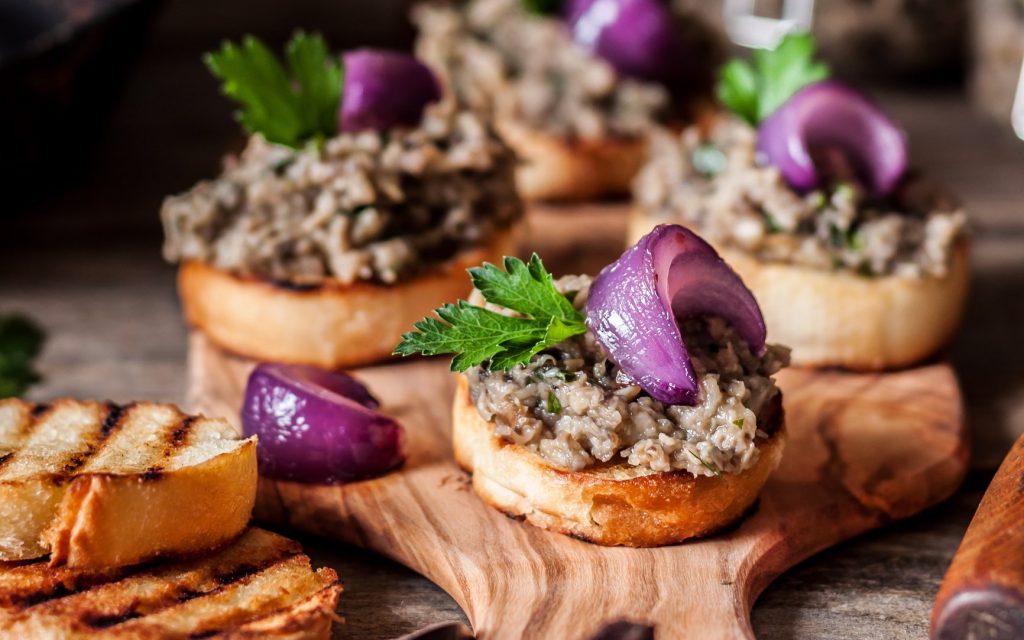
Final Thoughts
Mushrooms are versatile, delicious and full of healthy nutrients. But, many people only eat the caps and discard the stems.
You can eat mushroom stems, and they have the same nutrient profile and flavors as the caps, although some mushroom stems may be tough and woody.
There are numerous ways that you can use mushroom stems. So, save your mushroom stems and try some of the ideas above for a flavorful nutrient boost.
Visit our Mushroom Education Hub to learn more about the types of mushrooms you can enjoy or try one of our favorite mushroom recipes.
